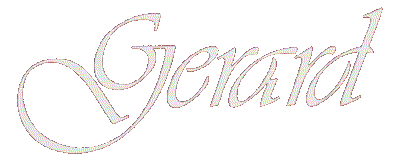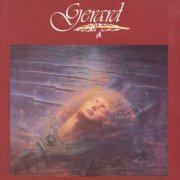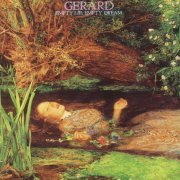




 |
 |
 |
 |
 |
 |
Gerard (1983, 48.31) ***/TT |
|
| Meridian Orpheus Chapter I: Cry for Help Chapter II: Decision Chapter III: Elysium Incantation Lasting Memory Revenge Melting Time |
Visionary Dream Midnight Dreamer |
|
 |
Empty Lie, Empty Dream (1985, 47.39) ***/T½The Acts of the ApostlesConquest of the Dark Wall Empty Lie, Empty Dream Hopeless Blue Star Future Love Game Again |
Current availability:
Mellotrons used:
The early incarnation of Gerard were a pretty 'mainstream' prog outfit, taking their musical cues as much from Marillion as from Genesis, with a US-influenced guitar sound; think a considerably more progressive Asia and you won't be a million miles away. Apart from the rather ubiquitous early-'80s polysynths, Toshio Egawa (Novela) plays Mellotron on a few tracks on Gerard; mostly choir, plus seriously high-in-the-mix strings on the Incantation/Lasting Memory segue, which sort of make up for the dodginess of the overall sound. Sort of. Saying that, whoever decided on that godawful drum sound should be shot at dawn, if not sooner. Hideous. Midnight Dreamer is the album's worst track, being almost an Asia clone, only a year after that band's debut album. It's not all bad, but most of it's far from good, too.
Empty Lie, Empty Dream, from two years later, carries on in pretty much the same vein, far too many cheesy bits and not enough truly epic moments. The drum sound is still pretty dreadful, though the production is marginally better, so those awful electronic tom rolls at least come in at the right level. Only two Mellotron tracks, assuming the choirs are actually synthesized; Wall has some fairly major strings, with less of the same on Hopeless Blue Star. Far from classic, to be honest. The reformed '90s band dispensed with the guitar, relying mainly on Egawa's Hammond work to carry their new style; despite the lack of Mellotron, I'd go more for this lineup if I were you. Saying that, Gerard does have one sublime Mellotron Moment, repeated several times, but it's not enough to make the album actually worth buying.
It's a moot point as to whether or not so-so Japanese neo-proggers Gerard ever actually split up; it seems more likely that they reinvented themselves (not that much of a reinvention, to be honest) in the mid-'90s as a bombastic, ELP-esque keyboard/bass/drums trio, long on flash and short on taste. As I said, ELP-esque. To add confusion to, er, confusion, the original, Japanese releases of their albums sometimes have differing tracklistings to Musea's European ones; I believe my reviews refer to the original issues.
1996's The Pendulum is exactly what you'd expect of such a formation, moments of near-excellence surrounded by acres of 900 mph keyboard work; bags of energy, largely misdirected. Funnily enough, this isn't a bad listen, by any means, the band's boundless energy making up for a lot. At least it's quite exciting. Toshio Egawa used a Mellotron on their first two, mid-'80s albums, after which it was presumably sold/scrapped/whatever, so it comes as a surprise to hear it here, but it's fairly obviously sampled, with a few seconds of strings at the end of Empty Lie, Empty Dream and a few sustained string notes on the closing title track.
The following year's Pandora's Box is more of the same, basically, the vocal tracks working less well than the instrumentals, to say the least. Instrumentally speaking, I'm sure I heard some ripping violin work at one point, but there's nothing in the credits: a particularly good synth patch? Samplotron-wise we get grungy strings on the well-titled Chaos, more of the same somewhere around the middle of the title track, under the bass solo (stop grimacing, it does nothing for you), a major part on Siren In The Mysterious Sea (more grimacing, this time at the 'quality' of the samples) and flutes and strings on Freedom. '98's Meridian features more of a fusion influence; fitting, given Gerard's high-energy approach, although Prelude (to what?) is an out-of-place, overblown power ballad that would only strengthen the album by its removal. Egawa adds samplotron strings to the title track, Empty Lie, Empty Dream (what, another version?), Revenge and Melting Time, for what it's worth.
For some indefinable reason, as it's stylistically identical to its predecessors, 2000's The Ruins of a Glass Fortress is a definite step up; perhaps Egawa has learned how to get the best out of his chosen style? The ten-minute The Edge Of Darkness is possibly the album's highpoint, but most of it's a definite improvement on their '90s work. Plenty of samplotron, too, notably the heavy-duty string part on Time Paradox. 2002's Sighs of the Water is another 'standard' Gerard album, although its opening salvo (slow, stately) briefly fools the listener into thinking they might've broadened their horizons slightly. No such luck, sadly, as the rest of the disc amply demonstrates, although anyone who likes their previous several releases is bound to like this one. Reasonable levels of samplotron, the most notable sections being the flute solo in Keep A Memory Green (also the part that completely gives the sample game away) and the strings on the closing title track.
2004's Power of Infinity repeats the formula, with one major difference. The band are at their best when writing instrumentals, so getting vocalist Alex Brunori (from '80s Italian band Leviathan) to guest on most tracks probably wasn't their best move. The quality of the material varies, with opening instrumental Caravan On The Moon and closing three-parter Blue World probably being the best, dragging the album's rating up half a star. Fakeotron on most tracks (given away by some solo sections), with a couple of solo string parts, without swamping the album, unlike so many sample users.
See: Novela | Keyboards Triangle | Arsnova